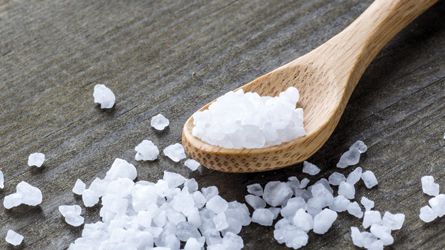
Press release -
South Africa first to legislate and on track to healthier levels of salt in foods
Good health news for South Africans. The foods people eat most are lower in salt than before, which means a lowered risk for the many documented health problems caused by eating too much salt.
South Africa was the first country in the world to introduce a law that stipulated salt targets for a wide range of processed foods. The bill, tabled in June 2016, set a maximum salt level for a basket of commonly eaten foods – among them bread, breakfast cereal, margarines, processed meats, soup, stocks and gravy powders, and instant noodles. The results of a recent study by The George Institute for Global Health are in – in the year leading up to the implementation of this law, South Africa’s food manufacturers are on track to meet expectations of the bill.
Terry Harris, a dietitian at Discovery Vitality and a co-author of the study, noted that this legislation came at the right time. Eating patterns with a high salt content increase blood pressure and are linked to cardiovascular disease and stroke, both highly prevalent in South Africa. She says, “Reducing salt intake by just two grams a day could reduce cardiovascular events by 20%. At a population level, encouraging and helping people to eat only the recommended 5 grams (one teaspoon) of salt a day, will definitely have large, positive public health effects.”
What does the research say? How has levels of salt in food changed so far? Dr Sanne Peters of The George Institute for Global Health says, “We found that almost 70% of the foods subject to this ground-breaking legislation had salt levels that either met or were below the new targets, which is very encouraging. It suggests many manufacturers have been actively reformulating their products to make them healthier.”
The study was done during the year leading up to the mandatory implementation date of the legislation. While it analysed more than 11 000 processed foods, just 1 851 of these are subject to the salt legislation. Key findings included that:
- 67% of the foods subject to legislation met the targets.
- Over 90% of breakfast cereals, porridges and uncured processed meats have salt levels below the allowed maximum.
- Just 27% of breads, 41% of potato crisps and 45% of raw processed sausages met new targets.
- Overall, half of all gravy powders exceeded the targets by a huge 50%.
- Meats outside the salt targets, including bacon, salami and biltong contained higher levels of salt than meats covered by the legislation.
Despite the already positive shift, too many food categories still contain worryingly high levels of salt. Just a quarter of the breads included in the study would have passed the new legislation – especially concerning given this is such a commonly eaten food. Harris concluded that it is essential for regular monitoring of processed foods to ensure manufacturers are meeting and sticking to the targets: “This need is particularly relevant when considering that between now and 2030, it is estimated that there will be a 17% increase in deaths caused by chronic conditions related to lifestyle, of which salt intake is a major contributing factor.”
Tips for reducing salt intake
Vitality suggest the following practical ways to further reduce salt intake:
- Swap breakfast cereals for boiled eggs or rolled oats.
- Select bread carefully: compare sodium levels per 100g and chose the bread with the lowest sodium (salt) content.
- Reduce processed foods of any kind. Processed meats like sausages, polony, viennas, biltong, dry wors, and deli or sandwich meats are high in salt.
- Cook food from scratch and choose loads of vegetables, wholegrain starches and fresh varieties of meats like cuts from the butchery, fresh poultry, and fresh or frozen fish with no marinade or seasoning.
- Make your own lower-salt broth and stock with fresh vegetables and meat – soups, and stocks are often made with huge amounts of salt. Although you may not use much, they can almost double your daily salt intake. Rather flavour food with unsalted herbs and spices, lemon juice, fresh garlic, fresh ginger, fresh chillies and unsweetened yoghurt.
There is still much work to be done. As the study says, “The South African food industry has an excellent opportunity to rapidly meet the legislated requirements.”
Topics
Categories
Discovery information
About Discovery Limited
Discovery Limited is a South African-founded financial services organisation that operates in the healthcare, life assurance, short-term insurance, savings and investment products and wellness markets. Founded in 1992, Discovery was guided by a clear core purpose – to make people healthier and to enhance and protect their lives. Underpinning this core purpose is the belief that through innovation, Discovery can be a powerful market disruptor.
The company, with headquarters in Johannesburg, South Africa, has expanded its operations globally and currently serves over 5 million clients across South Africa, the United Kingdom, the United States, China, Singapore and Australia. Discovery recently partnered with Generali, a leading insurer in Europe, and has partnered with John Hancock in the US. These new partnerships will bring Discovery’s shared-value business model to protection industries in Europe and the US.
Vitality, Discovery’s wellness programme, is the world’s largest scientific, incentive-based wellness solution for individuals and corporates. The global Vitality membership base now exceeds three million lives in five markets.
Discovery is an authorised financial services provider and trades under the code “DSY” on the Johannesburg Securities Exchange.
Follow us on Twitter @Discovery_SA







